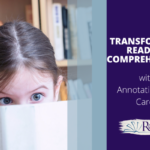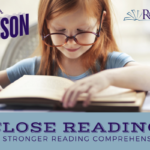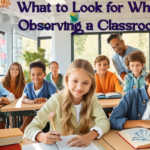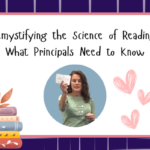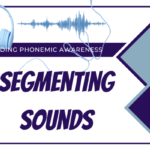Ever had your students annotate a text only to get a half-hearted effort and the inevitable, “Is this enough, Miss?” It’s a common challenge in classrooms, but don’t despair! Here’s how I turned this around with annotation cue cards, and how you can too. The Challenge: Superficial Annotations In an 8th-grade class I was working […]
Blog
A Close Reading Lesson for Stronger Reading Comprehension
Starting the school year with a focus on kindness and the power of words sets the stage for a compassionate and thoughtful classroom environment. In my recent lesson with a fifth-grade class, we delved into the story “Feathers” through a close reading, weaving in lessons on vocabulary, comprehension, and the profound impact of our words. […]
Unlocking the Power of Connectives: Practical Tips for Upper Elementary and Middle School Classrooms
As students advance through upper elementary and middle school, they encounter increasingly complex texts. One key to navigating these texts is understanding connectives—those magical words and phrases that link ideas together and clarify relationships. The research underscores the importance of teaching connectives to enhance comprehension and academic success. But how do we make this instruction […]
Boosting Classroom Engagement with Text Sets
Using text sets in the classroom can significantly enhance student interest, vocabulary, and background knowledge. Text sets are collections of related texts organized around a specific topic or line of inquiry. Here’s how to effectively implement them in your teaching strategy: 1. Anchor Text Begin with a rich, complex grade-level text as the anchor. This […]
What to Look for When Observing a Classroom: A Guide for Administrators Grounded in the Science of Reading
As an administrator, observing classrooms is a crucial part of ensuring effective instruction and supporting teacher development. When you walk into a classroom, you should see clear evidence of both word recognition and language comprehension being taught. Here’s a guide to help you know what to look for and the questions to ask to ensure […]
Demystifying the Science of Reading: What Principals Need to Know
The Current Landscape As we navigate the post-COVID educational landscape, one stark reality looms large: the national reading failure rates are alarming. The pandemic exacerbated existing challenges, leading to a significant drop in literacy rates, particularly among our most vulnerable students. This isn’t just a statistic; it’s a call to action for principals and administrators […]
Building Phonemic Awareness: Segmenting Sounds
Segmenting phonemes is an essential component of early literacy instruction. Segmenting phonemes refers to the process of breaking down spoken words into their individual sound units or phonemes. The science is clear: students need both word recognition and language comprehension skills. In this third part of a four-part series, we explore the different levels of […]
Building Phonemic Awareness: Blending Sounds
Blending phonemes is an essential component of early literacy instruction. Phonemes are the smallest units of sound in words, and blending phonemes is the process of combining those sounds to form words. The science is clear: students need both word recognition and language comprehension skills. In this second part of a four-part series, we explore […]
